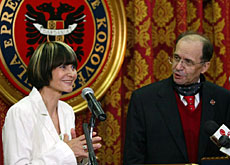Kosovo talks “no triumph” for Swiss diplomacy

Micheline Calmy-Rey’s trip to Kosovo will not go down as a "great moment in Swiss diplomacy", according to a Geneva-based professor of international politics.
In an interview with swissinfo, Andre Liebich said the Swiss foreign minister was jeopardising Switzerland’s neutral role by pushing for a form of independence for the province.
He was speaking as Calmy-Rey wrapped up a four-day tour of Kosovo, during which she held talks with President Ibrahim Rugova and Prime Minister Bajram Kosumi.
Her trip comes on the heels of a recent visit to Serbia and Montenegro, which was marked by a terse and unambiguous message from the authorities in Belgrade: Serbian President Boris Tadic told Calmy-Rey he was not open to discussion about independence for Kosovo.
The province officially remains part of Serbia and Montenegro, the union that replaced Yugoslavia.
But it has been under United Nations and Nato administration since a 78-day Nato-led air war halted a Serb crackdown on ethnic Albanians in 1999.
Liebich, of the Graduate Institute of International Studies in Geneva, said Switzerland should keep its options open if it is to win the trust of all sides during any talks about the future status of Kosovo.
swissinfo: Micheline Calmy-Rey has said that the reintegration of Kosovo into Serbia and Montenegro is neither desirable nor realistic. Do you agree?
Andre Liebich: Yes. There needs to be a new formula. After all, the country [that existed] before the war in Kosovo is not the country we have today.
Serbia and Montenegro is on the verge of splitting and there is no trace of the old Yugoslav federation. So there is no going back to how things were before, and that is something that I think is accepted even in Belgrade.
swissinfo: Would you agree with the Swiss foreign minister that the time is right to push for a decision about the future status of Kosovo?
A.L.: A valid case can be made for the idea that we need to jump-start the discussion. It was, after all, a real shock last year when there were riots in Kosovo and several Serbs were killed after a run-in between a Serb and an Albanian.
But a case could also be made for saying that we should let sleeping dogs lie and let the process of reconciliation take place. So you could also plausibly argue that we should let time take its course.
Having said all that, I would stress that nobody should pre-empt how this is all going to end. It is counterproductive to suggest that the outcome should be independence for Kosovo… because the point is not to close off any options but to create a situation where both sides are willing to make concessions.
swissinfo: Are you suggesting that Calmy-Rey has jumped the gun by referring to the possibility of a form of independence for Kosovo?
A.L.: That is possible. From what I have read, it seems that Calmy-Rey was keen to get a discussion [on the status question] on the table. But the discussion is already on the table and it didn’t need any particular new impetus. The other possibility is that what she has said has been manipulated and used by her hosts [in Kosovo].
The nuance of what she may have meant by “independence” seems to have been lost on the authorities in Kosovo, who appear to have presented Calmy-Rey’s message in such a way that it has become Swiss endorsement for a sovereign Kosovo state. All in all this is not going to go down as a great moment for Swiss diplomacy.
swissinfo: How much of a dangerous diplomatic game is Calmy-Rey playing?
A.L.: Fortunately Switzerland doesn’t have all that much weight. But I don’t think it reflects well on the reflective nature of Swiss diplomacy.
Take the neutrality card which Switzerland still holds. Of course neutrality doesn’t mean indifference to what happens and it doesn’t mean disengagement, but it does mean keeping options open. And that is what hasn’t happened during this visit, and that’s why I’m disappointed.
Of course [Calmy-Rey’s reference to independence] may simply be an unfortunate turn of phrase which has been exploited by people on the spot… but I haven’t seen a retraction on her part.
swissinfo: But Calmy-Rey does appear to have toned down talk of independence by reportedly referring, for example, to the idea of a confederation between Kosovo and Serbia and Montenegro…
A.L.: That is the sort of direction in which I think we should be heading. But it’s a question of sequence. Do you first promise Kosovo independence, give it and then try to create some kind of regional set-up? That doesn’t seem promising at all.
Or do you first go about setting up a confederation with its own rules and then work [within this framework] towards sovereignty? That’s a good direction to go in, but it doesn’t seem to be the thrust of what Calmy-Rey has been saying.
swissinfo-interview: Ramsey Zarifeh
A 78-day Nato-led air war halted a Serb crackdown on ethnic Albanians in Kosovo in 1999.
In the same year the United Nations took over administration of the province.
The Kosovo leadership wants independence from Belgrade, but Serbia is opposed to this.

In compliance with the JTI standards
More: SWI swissinfo.ch certified by the Journalism Trust Initiative









You can find an overview of ongoing debates with our journalists here . Please join us!
If you want to start a conversation about a topic raised in this article or want to report factual errors, email us at english@swissinfo.ch.